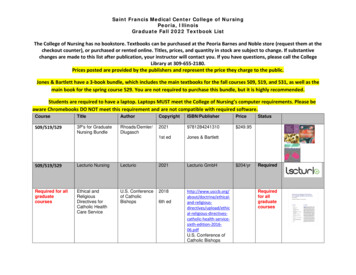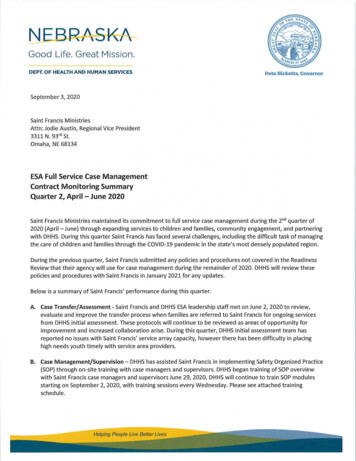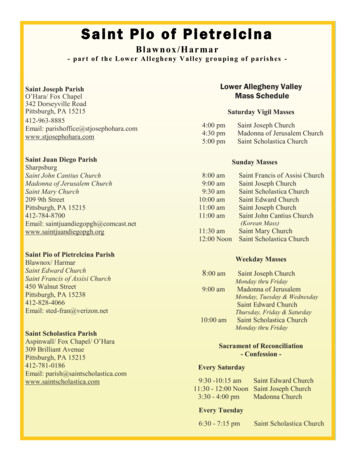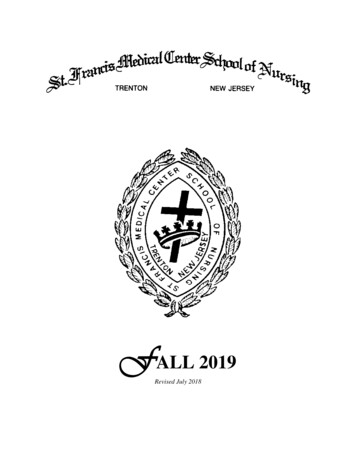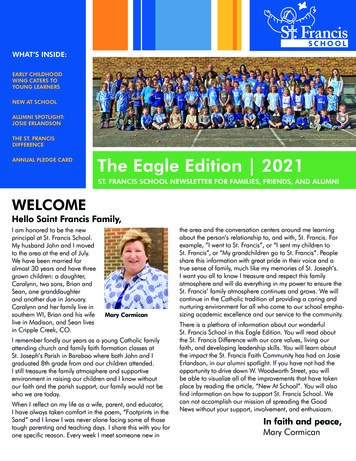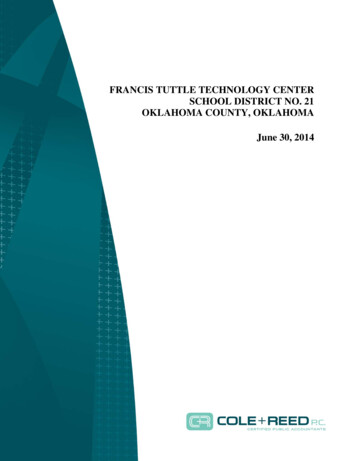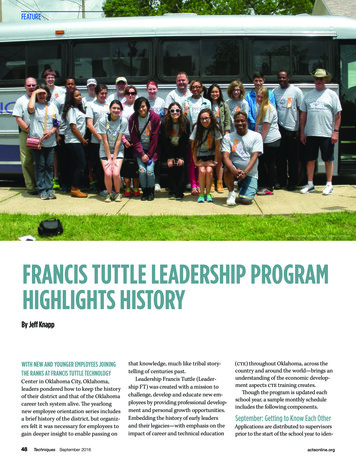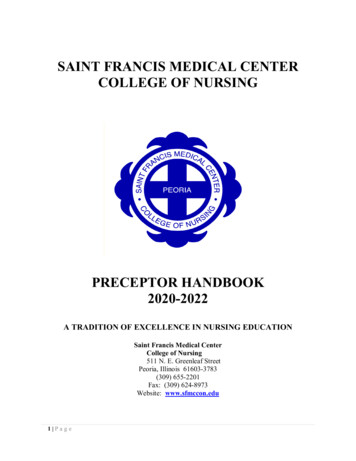
Transcription
SAINT FRANCIS MEDICAL CENTERCOLLEGE OF NURSINGPRECEPTOR HANDBOOK2020-2022A TRADITION OF EXCELLENCE IN NURSING EDUCATIONSaint Francis Medical CenterCollege of Nursing511 N. E. Greenleaf StreetPeoria, Illinois 61603-3783(309) 655-2201Fax: (309) 624-8973Website: www.sfmccon.edu1 Pag e
TABLE OF CONTENTSTHE COLLEGEAbout the Preceptor Handbook. 3Mission Statement . 4Philosophy . 4College Goals. 6Vision . 6Quality Statement . 6Statement of Values . 7OUTCOMES, DEFINITIONS, AND QUALIFICATIONSBaccalaureate Program Outcomes . 8Master’s Program Outcomes . 9Doctor of Nursing Practice Program Outcomes . 9Introduction . 9Definition and Characteristics of Preceptor . 10Qualifications of the Preceptor . 10Pedagogy Principles for Preceptor . 11ROLES AND RESPONSIBILITIESPreceptor . 12Student . 12Faculty . 13TYPHON CLINICAL TRACKING SYSTEMIntroduction . 14SETTING UP CLINICAL SITESClinical Practicum Residency Process . 15Request for Clinical Agreement or Letter of Understanding andFaculty Evaluation of Clinical Site* . 16Intended Preceptor WorksheetAPPENDICESPreceptor Agreement . . Appendix AStudent’s Evaluation of Practicum Experience . Appendix BStudent Evaluation of Preceptor . Appendix CStudent Evaluation of the Clinical Site . . Appendix DIntended Preceptor Worksheet . . Appendix ERequest for Practicum/Clinical Affiliation Agreement Request forLetter of Understanding and Clinical Evaluation . Appendix FRolling Preceptor Agreement .Appendix GPreceptor Orientation Checklist . .Appendix HPreceptor Letter . .Appendix I2 Pag e
Preceptor HandbookThe College of Nursing provides supportive, faculty-supervised practicum/clinicallearning experiences necessary to prepare qualified entry level and advanced practitioners towork in a variety of health care and educational settings. This Handbook establishes the Collegeof Nursing guidelines for using qualified Masters or doctorally prepared Registered Nurses(RNs), master’s prepared physician assistants or physicians as preceptors to assist withclinical/practicum/residency instruction. The document defines the roles and responsibilities offaculty, students, and preceptors. These guidelines apply to preceptor and student relationshipsthat are consistent and last an extended period of weeks. In designated courses, the student willwork under the direct practicum instruction of the preceptor who will guide and monitor studentlearning. The faculty retains the responsibility for student instruction and supports both thestudent and preceptor by providing expertise to ensure that the learning experiences meet thecourse/practicum outcomes. The preceptor and the faculty member collaborate in planning,monitoring, and evaluating the student. Faculty retains ultimate responsibility for the student’sevaluation.3 Pag e
ABOUT THE COLLEGEMISSION STATEMENTSaint Francis Medical Center College of Nursing is a private, Catholic, specialized institution.The College, founded and operated by The Sisters of the Third Order of Saint Francis, isenriched by the heritage of the Sisters who have a mission of caring and commitment to qualityhealth care.The College provides nursing education programs at the undergraduate and the graduate levels.The upper division baccalaureate program prepares the student for the practice of professionalnursing. This program builds on and incorporates theories, concepts, and principles frombehavioral, natural, and social sciences. The graduate program builds on the prior nursingknowledge and experiences to prepare the nurse for the advanced roles in nursing. The Collegeserves the community by educating competent entry level and advanced practitioners in atradition of excellence in nursing, who deliver caring, comprehensive, and complex careresponsive to the changing needs of society in a dynamic healthcare environment. The facultyand students of the College participate in both scholarly and service activities that contribute toknowledge development related to education, nursing, and healthcare.Faculty 1/99College Board 2/99, 10/01OSF Healthcare Systems Board 3/00Reviewed 6/2002Faculty/College Senate 5/2008College Board 6/2008OSF Healthcare System Board of Directors 7/2012PHILOSOPHYThe philosophy of Saint Francis Medical Center College of Nursing, developed by the faculty, iscongruent with the Corporate Philosophy and Corporate Mission Statement of the Sisters of theThird Order of St. Francis. It is in accord with Catholic philosophy and follows the ideals of St.Francis of Assisi, who had a great love for God and humankind, especially the sick and the poor.Philosophy of NursingWe believe each person is created by God with a mortal body and an immortal soul whoseultimate aim is eternal salvation. We believe each person, born with intellect and free will, haspersonal dignity and natural rights with associated responsibilities to God, humankind, andsociety.The individual, as a member of society, is an adaptive being who is constantly interacting withthe environment while striving toward self-actualization throughout the life cycle. We believesociety is a multicultural system composed of interdependent individuals, families, groups andcommunities. Society has the responsibility to provide a health care system, which is responsiveto changing knowledge, technology, and human resources, and is accessible to its members. Thefaculty believes health is a dynamic state in which the individual adapts to one’s internal andexternal environments so that there is a state of physical, emotional, intellectual, social andspiritual well-being. We believe that health encompasses both wellness and illness. Inherent inthe individual’s rights is the right to attain optimal health and the right to health care.4 Pag e
We believe professional nursing is an art and an applied science which builds on the behavioral,natural, and social sciences. Nursing utilizes selected concepts, theories, principles, and researchin the implementation of the nursing process. The nurse, through application of the nursingprocess, assists the patient in achieving optimal health status by facilitating adaptation within theindividual’s social system. As the health care system changes, the professional nurse must beprepared to assume a variety of emerging roles. The goals of nursing are the promotion andmaintenance of health, the care and rehabilitation of the sick and the injured, and the support ofthe dying. To achieve the goals of nursing, the professional nurse collaborates with the patient,family, and members of the interprofessional health care team in planning and providing care,and in promoting health of the individual, the family, and the community.We believe caring is an essential element of both the art and science of nursing. Caringpermeates all areas of nursing practice and facilitates the achievement of nursing goals. Caring isa helping relationship which is influenced by cultural and spiritual values and which promotesgrowth and self-actualization of the patient and the nurse.Philosophy of Nursing EducationThe faculty believes that the purpose of nursing education is to promote a student centeredlearning environment that develops critical thinking, skills of inquiry, creative thinking andproblem solving in the process of obtaining knowledge. The faculty believes that learning, a lifelong process, occurs when the individual is an active participant. Learning is both an independentand interdependent process. We believe that students learn through cyclical processes in whichtheory and practice reinforce one another. The faculty accepts responsibility as educators tofoster a student centered learning environment which maximizes each individual’s uniquepotential. The learner in a student centered learning environment draws from previousexperiences to make meaning of current situations.We believe that the student is a unique individual who has intrinsic worth, is deserving ofrespect, and is capable of making informed decisions regarding learning. The faculty recognizesthat the learner comes from a sociocultural background with diverse life experiences and variedattitudes and values. The faculty believes that the student is at the center of the curriculum and isan active participant in learning and “coming to know”. The faculty acts as a guide and facilitatorin the learning process and is responsible for the development, implementation, and evaluation ofthe learning experience. Planned learning activities advance intellectual inquiry, self-reflection,critical thinking, effective communication, and self-directed, independent learning.We believe that the goal of the academic programs is to facilitate deep learning which involvesthe critical analysis of new ideas, linking them to already known theories, concepts, andprinciples. This type of learning leads to understanding and long-term retention of concepts sothat they may be used as the basis for problem solving in unfamiliar contexts. Deep learningpromotes understanding and application for life.Baccalaureate and Graduate EducationThe faculty believes that the baccalaureate nursing education builds upon and incorporates thenatural and social sciences and the liberal arts. This broad foundation provides the understanding5 Pag e
of humankind and society necessary for the learner to begin the implementation of the nursingprocess. We believe professional nursing education integrates theories, principles, andknowledge from the general studies with nursing theories, concepts, and experiences.Baccalaureate nursing education prepares the graduate for the practice of professional nursing asa generalist who is able to function independently and interdependently with individuals,families and groups in a variety of health care settings. Graduate nursing education prepares theindividual for advanced nursing practice. The graduate is prepared to function autonomously in avariety of roles and settings. Students integrate theory, research, and practice for theimprovement of patient care and the advancement of nursing practice and the profession.We believe the Judeo Christian tenets underlying the nursing education at Saint Francis MedicalCenter College of Nursing promote values essential for the personal and professional philosophyof God and humankind. These values, inculcated throughout the curricula, guide the learner toevolve into an ethical and accountable professional nurse.Faculty/College Senate 5/2008College Board 6/2008OSF Healthcare Systems Board 7/2012COLLEGE GOALSSaint Francis Medical Center College of Nursing offers educational opportunities which: Prepare the graduate to practice professional nursing in a variety of roles and health caresettings.Provide the essential foundation for graduate study in nursing.Foster the commitment to personal and professional growth and accountability.Reviewed 3/00VISIONEmbracing our Catholic heritage and standards of nursing excellence, Saint Francis MedicalCenter College of Nursing will provide the highest quality nursing education programs thatproduce the most prepared nurses, leaders, and educators capable of administering the highestquality professional nursing care and nursing education.QUALITY STATEMENTQuality is our commitment to excellence in nursing education, being the very best of the best. Itis achieved by applying Quality Improvement initiatives to reach beyond expectations inteaching, learning, and services to students and stakeholders.Approved: College Senate 3/106 Pag e
STATEMENT OF VALUESThe philosophy of Saint Francis Medical Center College of Nursing, developed by the faculty, iscongruent with the Corporate Philosophy and Corporate Mission Statement of The Sisters of theThird Order of St. Francis. It is in accord with Catholic philosophy and flows from the ideals ofSt. Francis of Assisi who had a great love for God and humankind, especially the sick and thepoor. The following values flow from this philosophy and permeate all aspects of the College.The purposes of the College of Nursing Value Statements are to: support the mission andphilosophy, provide direction for the day-to-day activities and decisions, specify how individualsshould behave, and provide meaning to each person’s work.I. Personal & Professional DevelopmentLearning- is a lifelong, interactive process in which critical thinking and intellectualinquiry skills are developed and a change of behavior, attitude or thought patterns occur.Learners are valued as unique individuals, with diverse life experiences and variedattitudes and values, who are active participants in the process.Caring- develops helping relationships influenced by cultural and spiritual values andpromotes the growth and self-actualization of the client, nurse, student, and employee.The College values open and honest communication, which fosters trusting relationshipsamong ourselves and those we serve.Leadership- is facilitating action by developing people to achieve and maintain change.Leadership embraces the importance of responsibility, accountability, and commitment. Itis the ability to have a vision for the College, enable and empower other to attain thevision through using and developing trusting relationships.Personal worth & dignity- recognizes the unique value of each person as an individual,regardless of race, color, age, gender, ethnic background, or religion. Born with intellectand free will, the individual is a member of society and an adaptive being who isconstantly interacting with the environment while striving toward self-actualizationthroughout the life cycle.II. ServiceIntegrity - believes in Judeo-Christian tenets, which permeate the curriculum andpromote the ethical values of human dignity, justice, service, and respect for life. Thesevalues provide a foundation for the institution in its practices and relationships and areessential in the College's commitment to high standards of institutional and individualintegrity.Responsibility- is the obligation to accomplish a task or assignment. Acceptingresponsibility for one’s work or life provides a sense of inner control, which leads toowning responsible for what is happening in one’s life.7 Pag e
Accountability- is defined as the act of accepting ownership for one’s responsibilitiesand the results or the lack of results, without blame and rationalizations. Accountabilityfocuses on outcomes. Accountability is a personal choice to demonstrate ownershipnecessary for achieving the desired, clearly identified outcomes and results. We believethat each employee will ask what else I can do to achieve, advance, grow, or enhance theachievement of the outcomes of the College and their personal life. The College acceptsresponsibility and holds each other accountable for carrying out the Mission of theCollege through quality nursing education, qualified faculty, and sufficient support forexcellence in student learning outcomes. The College strives to educate students aboutthe need for personal and professional accountability.III. Quality –includes excellence. We believe in achieving the best results possible; notjust doing a job.Excellence-is the commitment to quality nursing education programs at theundergraduate and graduate levels. Quality and excellence are ensured through thecollection, analysis, and use evidence based practice and education and data from theSystematic Evaluation Plan for development, maintenance, or revision of the educationalprograms and outcomes of the College. The College is committed to being the best of thebest.IV. Agility – is the commitment to being future focused and forward thinking in planning anddelivering nursing education programs. This forward and focused thinking propels theCollege towards its Mission of excellence in nursing education.Baccalaureate Program OutcomesThe graduate:1. Synthesizes theories, concepts, and principles from behavioral, natural and socialsciences, technologies, and nursing as a foundation for the practice of professionalnursing.2. Implements culturally appropriate caring behaviors in nursing practice.3. Integrates written, oral, technology, and information literacy skills to facilitatecommunication within the nurse patient relationship and interprofessional collaborationin a variety of health care settings.4. Models critical thinking, skills of inquiry, and problem solving skills for effectivedecision making in nursing practice based on best evidence.5. Implements the nursing process to assist patients and families throughout the life cycle inreaching optimal health by facilitating adaptation of physical, emotional, intellectual,social, and spiritual well-being.6. Applies leadership through engaging in professional nursing within a political, legal,ethical, social, and financial framework to implement patient safety and quality within thecontext of the interprofessional team and healthcare system.7. Demonstrates responsibility and accountability for personal and professional growth anddevelopment and is responsive to emerging roles within the profession.8. Employs the process of self-reflection to continually improve practice and engage inlifelong learning.8 Pag e
Master’s Program Outcomes1. Integrate theory, research, and practice using critical thinking, to promote safe and highquality patient care for individuals and populations in a variety of settings.2. Practice autonomously in a variety of professional roles to respond to the social, economic,ethical, political, and legal issues impacting the needs of patients and the nursing profession.3. Express caring in professional interactions, which supports the values and promotes thegrowth and self-actualization of individuals, groups, and communities.4. Provide interprofessional collaborative leadership within the dynamic health care system in aculturally diverse society.5. Synthesize the principles of education and practice to advocate for interventions thatpromote, maintain, and restore health for individuals and populations.6. Analyze factors for delivering high quality patient care through utilization of informatics andtechnology.Doctor of Nursing Practice Program Outcomes1. Incorporate advanced levels of clinical judgment and scholarship in nursing and leadership.2. Appraise scientific knowledge, as well as new and current approaches in nursing practice andleadership, to promote optimal outcomes.3. Examine leadership in organizations and systems to assure quality care delivery models.4. Design, deliver, direct, and disseminate evidence-based practices.5. Evaluate programs, healthcare delivery systems, and outcomes using information systems.6. Advocate for healthcare practice change through policy development and evaluation.7. Assume appropriate leadership roles for effective interprofessional collaboration to achieveoptimal outcomes.8. Combine ethical principles with decision making processes in healthcare practices andsystems.9. Integrate advanced clinical reasoning and judgment in the management of complex clinicalsituations and systems.INTRODUCTIONThe College of Nursing uses preceptors in the Nursing Programs to:a.) Bridge the gap between nursing practice and nursing education.b.) Provide orientation, supervision, and guidance to students in various practicumexperiences.c.) Serve as role models and mentors to students.The College maintains responsibility for student learning as faculty plan, monitor, and evaluatestudent experiences. The College recognizes that preceptors need preparation and assistance intheir role with students. The preparation and assistance are provided through this handbook andfaculty instruction.9 Pag e
How Does the Preceptor Benefit?Preceptors continually state that precepting brings back the joy of clinical practice, and many saythey feel as though they are giving back to the profession. Preceptors feel less isolated and enjoythe reward of sharing their knowledge. Not only does the learner improve clinical skills, butpreceptors also report that they, too, benefit from reviewing the basics and seeking newknowledge. Preceptors are recognized as role models, increase their visibility in their practices,and potentially their promotability (National Organization of Nurse Practitioner Faculties, 2015).Preceptors can also benefit their practices by recruiting medical professionals with whom theyhave worked day-to-day. APN Preceptors in Illinois receive 30 CEUs if they precept 120 hoursa year.What Do Learners Expect From Their Preceptorship?Students want to be able to practice interpersonal skills, collect subjective and objective data,opportunities to interpret the data, and manage the patient’s care. Students want the preceptor tobe a guide but to encourage independence when the student is ready (Association of Professorsof Gynecology and Obstetrics, 2006).DEFINITION AND CHARACTERISTICS OF A PRECEPTORThe word “preceptor” means teacher or instructor. In the medical profession, preceptorship, then,is defined as a time of practical, real-world training.The practicum/residency preceptor may be a qualified master’s or doctorally prepared nurse,advanced practice nurse, nurse practitioner and/or physician from clinics, private, or grouppractice settings. The preceptor serves as a role model and resource person for a specific periodof time for an individual enrolled in a practicum course at the college.QUALIFICATIONS OF THE PRECEPTOR1. The practicum preceptor may be a qualified master’s or doctorally prepared nurse, advancedpractice nurse, nurse practitioner, Master’s prepared physician’s assistant and/or physicianfrom clinics, private, or group practice settings. The preceptor serves as a role model andresource person for a specific period of time for an individual enrolled in a practicum course atthe college. Preceptor for the Baccalaureate student must have a Bachelor’s degree in nursing.2. Preceptor for the Master’s student must have a minimum of a Master’s degree in Nursing orrelated field (dependent on the option selected), advanced practice nurse, master’s preparedphysician assistant, and/or physician.3. Preceptors for DNP students must be master’s prepared; doctorate preferred.4. Able to provide a practice setting and patient population that facilitates student learning andachievement of course outcomes.5. Able to provide adequate space in the practicum facility to allow learning to occur and notinterfere with patient flow.6. Able and willing to precept the student in the practicum setting for the required number ofhours within the time-frame of the course.10 P a g e
7. Provide feedback in the evaluation of the student’s performance and achievement of learningoutcomes.8. Able to make available time to periodically review the student’s learning outcomes and providethe student with direction related to his/her achievement in that setting.9. Willing to critically evaluate the student’s progress during and at the end of the practicumexperience.10. Willing to participate in the student’s evaluation of the learning experiences provided throughTyphon.11. Willing to meet with the College faculty as needed during the semester to facilitate thestudent’s progress.PEDAGOGICAL PRINCIPLES FOR PRECEPTORSThe art and science of the teaching/learning process is termed “pedagogy”. At SaintFrancis Medical Center College of Nursing, we employ a student-centered curriculum thatembraces experiential learning methods of pedagogy. What does this mean to our preceptors?Student centered learning places the responsibility for learning on the student who workscooperatively with peers and faculty (including preceptors) to establish mutual learning goals.The premise of student-centered learning is that students will have greater motivation to learn ifthey perceive that they have a vested interest in their own learning. Instead of the teacher beingthe sole, infallible source of information, the teacher shares control of the learning environment.Students are encouraged to explore, experiment, and discover on their own and in cooperationwith peers. An important aspect of student-centered learning is the practice of experientiallearning. Such “hands-on” opportunities facilitate the student’s ability to make connections insuch a way that the student is able to successfully apply previously learned concepts to new andunfamiliar situations.Important premises of student centered/experiential learning include the followingconcepts: the student is an active participant in the learning process; the student assumesresponsibility for his/her own learning; the student and teacher (preceptor) form a partnership forthe achievement of learning outcomes; the student works collaboratively with peers, faculty,preceptors, and health care staff to master concepts as outlined by the curriculum; and thestudent, through the process of experiential learning, is able to appropriately employ previouslylearned information when faced with new situations.The curriculum emphasizes experiential learning which affords students the opportunityto integrate abstract, conceptual knowledge into concrete applications, leading to broader, moreenduring learning outcomes. Experience is crucial to the process of learning because it bringspeople together and encourages participation. The real-world experiences in the clinical settingwhich allow the student to work with actual patients, as well as simulated experiences in theclinical laboratory, are invaluable to the student’s development as a competent practitioner.The curriculum of the College facilitates the ability of students to comprehend and applyfundamental concepts by fostering the students’ ability to relate abstract ideas to the concretepractical realities of life; assisting students to clearly readily see the application and “need toknow” of new information related to their own accumulated experience and wisdom; facilitatingthe development of time-management and teamwork skills in response to societal and workplaceexpectations; and developing partnerships with students, faculty, and employers to provide11 P a g e
graduates with the knowledge, skills and experience they need to lead successful professionallives.In keeping with the pedagogical practices of the College, preceptors are asked to serve as“guides on the side” and allow students to progressively develop increasing autonomy in clinicalpractice. The student, preceptor, and faculty all play crucial roles and share responsibility in thelearning process. Close communication between all three individuals is critical for studentsuccess.ROLES AND RESPONSIBILITIES: Preceptor1. Acts as a role model and support system for the student.2. Facilitates and guides the learning process of the student.3. Orients the student to the health care facility and staff including policy and proceduresrelated to the experience.4. Assists the student in the attainment of course outcomes and student learning outcomes.5. Collaborates with the student to evaluate measures to determine the attainment of outcomes,and appropriate learning opportunities and activities to meet the outcomes.6. Assists the student with communication (EHR and dictation) within the health organization.7. Meets with the student as needed and reviews accuracy of student written work.8. Contacts faculty as needed to clarify any issues and concerns.9. Provides feedback in the evaluation of the student’s performance and achievement oflearning outcomes.11. Verifies student’s clinical hours in the Typhon clinical tracking system or time log.12. Faculty is responsible for writing summative student evaluations, but the required preceptorevaluations of students are essential for input into the evaluation.ROLES AND RESPONSIBILITIES: Student1. Fa
COLLEGE OF NURSING . PRECEPTOR HANDBOOK 2020-2022. A TRADITION OF EXCELLENCE IN NURSING EDUCATION . Saint Francis Medical Center . College of Nursing . 511 N. E. Greenleaf Street . . ultimate aim is eternal salvation. We believe each person, born with intellect and free will, has
